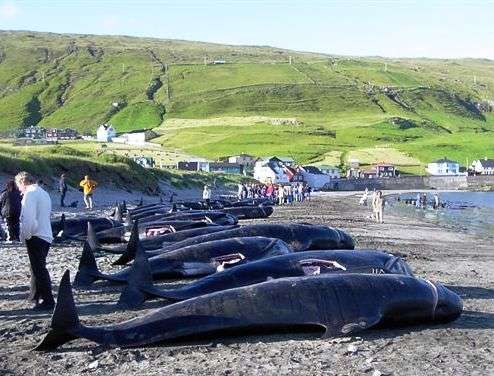September 5, 2014 report
Marine experts suggest IWC learn from ICJ ruling when reviewing whale research proposals

(Phys.org) —A trio of marine scientists has printed a Policy Forum piece in the journal Science, detailing the recent history of Japan's research projects in the Antarctic region, and suggesting that the International Whaling Commission (IWC) learn from the recent International Court of Justice (ICJ) ruling that found Japan's research project unscientific and put a stop to it. In their article, William de la Mare and Nick Gales, of the Australia Arctic Division and Marc Mangel with the University of California, suggest that in the future, the IWC follow the logic outlined by the ICJ in making their decisions, hopefully setting a precedent.
Japan has a long history with whaling, going back hundreds of years—as late as the 1960's whale meat made up nearly a quarter of the Japanese diet. In more recent times, due to the decline in numbers of whales and an international ban on whaling, whale meat has become scarce in Japan, it's only available to a select few who take advantage of whales caught and killed under special permits issued as part of the Japanese Whale Research Program (JARPA II). This practice has come under harsh criticism from other non-whaling countries, such as Australia and New Zealand, who find Japanese whaling in their part of the world, intrusive and unnecessary, and not very scientific.
This past March, officials in Australia petitioned the ICJ to review JARPA II, claiming that the program was not very scientific and thus should be halted. After reviewing the program, including noting the numbers of whales killed, the ICJ ruled that the program was not scientific because the number of whales killed was far fewer than was specified by the Japanese in their original proposal. Logic dictates, they noted, that if a certain number of whale kills were needed to achieve a scientific goal, and the Japanese researchers were not reaching those numbers, than either the objective would not be reached, or the original estimates were incorrect. Either way, the program was clearly not following scientific protocols and therefore it should be halted.
The Japanese are reportedly reworking a proposal to send to the IWC, which is set for review in the near future. It is this new proposal and the review process that has stirred de la Mare, Gales and Mangel to action. The article they've written is a challenge aimed squarely at the IWC—they request that those on the commission learn from the work done by the ICJ and use logic when reviewing research requests that involves killing whales. They note that the commission had access to the same data as the ICJ but were swayed by Japanese claims that the data was politically motivated. They conclude by noting that scientific research, when done properly, should not leave room for opinion or political views.
More information: Applying scientific principles in international law on whaling, Science 5 September 2014: Vol. 345 no. 6201 pp. 1125-1126. DOI: 10.1126/science.1254616
Abstract
In March 2014, the International Court of Justice (ICJ), the principal judicial organ of the United Nations, ruled that a Japanese whaling program in the Antarctic, ostensibly for scientific purposes, was not sufficiently research-oriented and thus was illegal. The ICJ's critical assessment represents the first time that scientific whaling has been reviewed by an authoritative body outside the International Whaling Commission (IWC). With Japan considering a replacement program, and the IWC meeting later this month, we discuss minimum realistic actions the IWC should take in response to the ICJ judgment. More broadly, we believe the approach used by the ICJ in reaching its judgment provides a precedent for how arbitrators might assess scientific principles when resolving complex technical disputes.
Journal information: Science
© 2014 Phys.org


















